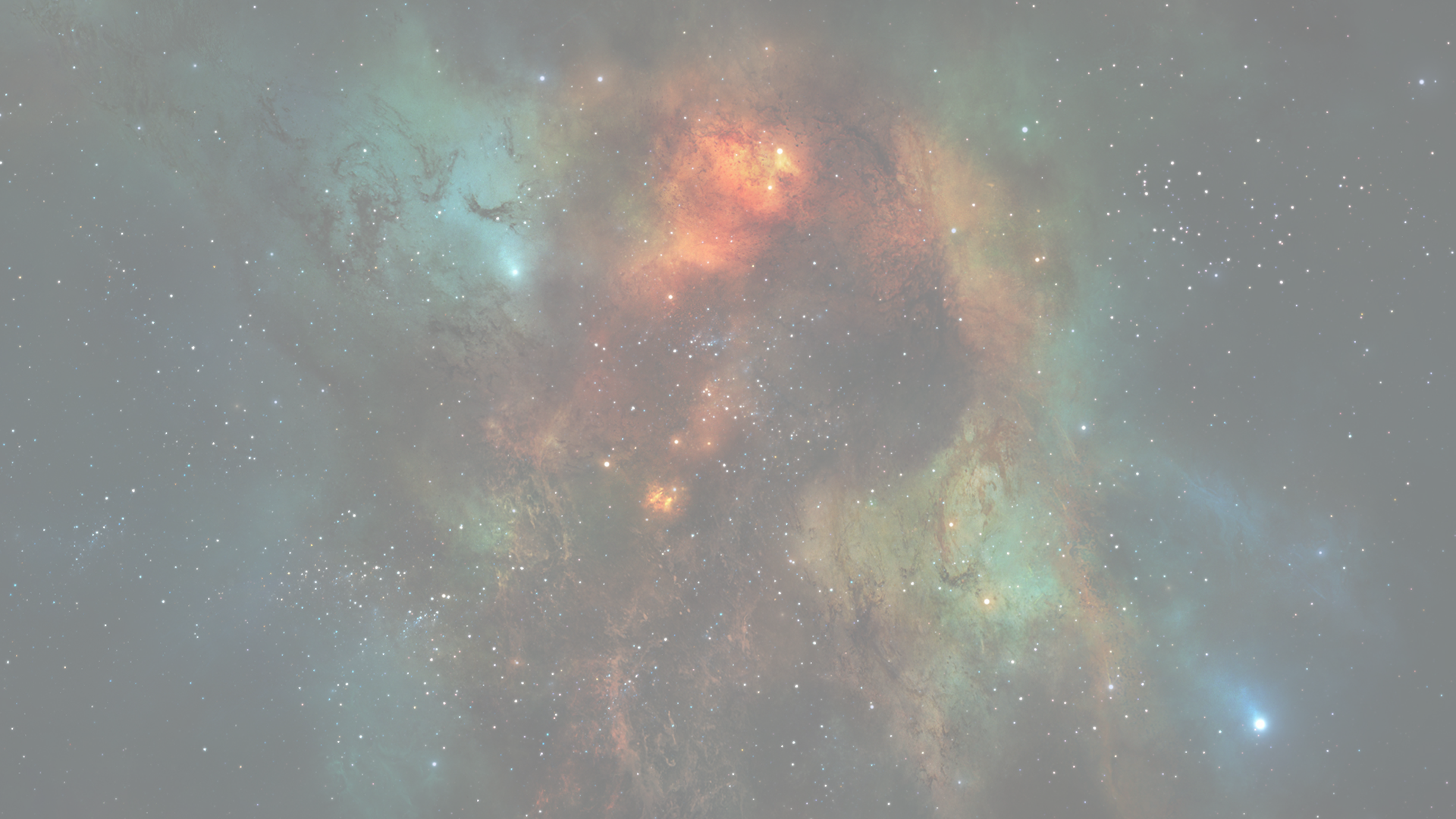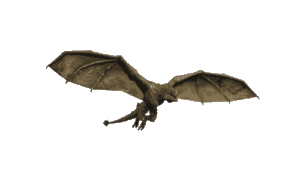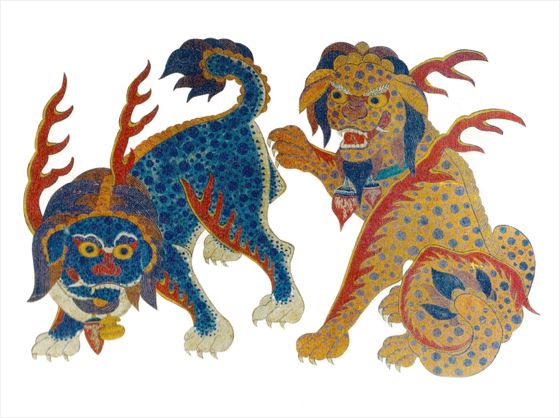Founding Myth of Gojoseon
In the heavens lived a god by the name of Hwanung, third son of the Heavenly Emperor Hwanin. One day Hwanung expressed his worries for the humans of the earth, and his wish to rule them in order to 'widely benefit the Human World' ('Hongik-Ingan', now South Korea's national motto). Moved by his devotion, Hwanin allowed him to descend into the world and rule. He gave his son Three Heavenly Seals (Cheonbu-samin), along with the group of three thousand servants and the Three Lords of wind, rain, and cloud. Hwanung thus descended onto the world. He first arrived at the mountain-top of Mount Taebaek and there established a city named Shinshi ('City of the Gods'). Hwanung took care of 360 human affairs, including agriculture, life, illness, justice, good and evil, etc.It was during this time that a Tiger and a Bear approached him, wishing to become humans. Hwanung gave both of them a handful of mugwort and twenty cloves or garlic, with which they had to stave off their hunger while remaining inside a dark cave without seeing the sunlight for 100 days. The tiger ran away before the ordeal was through, but the bear remained patient and on the twenty-first day turned into a beautiful woman. The woman was given the name Ungnyeo (Bear-woman).Not long after her transformation, Ungnyeo began to crave a child, and thus Hwanung took human form for a short time, and through him she gave birth to a son. This son was Dangun, forefather of the Korean people. Dangun established a kingdom he called Asadal, meaning "place where the morning sun shines". This name was later changed to Joseon (now called Gojoseon, or Ancient Joseon to distinguish it from the later Joseon kingdom). Legend has it that when Dangun was 1,908 years of age, abandoned the human world and became a Sanshinryeong('Mountain God').Similar to the stories of Osiris and Manco Capac, in that they all deal with 'culture heroes' teaching humans on how to live.
Notable Deities
Called Shin (meaning 'spirit'or 'deity', and equivalent of the Kami), they are supernatural entities that influence people, and are served by the Mudang (female shamans) in rituals called Gut (pronounced 'goot'). It should be noted that in Korean mythology, which god is charged with which area of responsibility slighly varies with each tale (for example, the Goddess of Birth is Samshin-Halmang or Danggeum-aegi, depending on versions). And the level of power differs with each (e.g. gods of nature are considered more powerful than the guardians of the house).
- Sang-je (Heavenly Emperor): The supreme ruler of the Heavens, also called Hanuelnim, Hwanin, Cheonwang, Cheonjiwang (all meaning 'Heavenly Ruler'). He is often compared with the Jade Emperor, since their roles are similar. He oversees humans and gods, and sometimes elects humans to become new gods.
- Haemosu: Heavenly Emperor's first son and God of the Sun. He is depicted as a youth wearing crow-feathered headdress (crows, especially three-legged crows, symbolizes the sun in many asian myths), carrying the sword Yonggwanggeom ('Sword of Dragon's Light'), and riding Oryeonggeo, a chariot pulled by five dragons. He is the founder of Buyeo Kingdom
 , and later fathered Go-Jumong
, and later fathered Go-Jumong , who founded the Goguryeo Kingdom(which eventually conquered Buyeo).
, who founded the Goguryeo Kingdom(which eventually conquered Buyeo). - Samshin-Halmang: Goddess of Life. She was once a human girl, but after winning the flower-blooming contest (flowers symbolize life in Korean mythology) between her and the Yongwang's daughter, she became the Goddess charged with pregnancy and delivering of babies. (The aforementioned yongwang's daughter became the goddess of the underworld, and takes care of the spirits of dead infants.) She protects babies and mothers from harm, and is the patron of midwives. It is said that after midwives die, they become spirits called 'Samshin' and help Samshin-halmang.
- Sanshinryeong: Gods of the mountain, and since Korea has lots of mountains, there sure are lots of them. A typical Sanshinryeong is depicted as an old man with a white beard, accompanied by a tiger. As guardians of the mountain, they usually live deep inside the mountain, but sometimes appear in Sadangs (shrines) at the base of the mountain, listening to people's wishes and pleas for help (usually lumberjacks and hunters asking permission to cut down trees and hunt animals, since Sanshinryeongs protect nature). Although they are mostly male, there are female examples like Mago-halmi, Sanshinryeong of the Mount Jiri.
- Chilsungshin: Seven gods of the Great Dipper. They bless people with good luck and longevity, and thus one of the most commonly worshipped gods of Koreans (their worshipping dates back to Bronze age). They are usually depicted as seven brothers, wearing government uniform or Monk's attire (since they are sometimes called Seven Buddhas). However, some descriptions list them as three brothers and four sisters, or seven sisters.
- Gataekshin: Guardians of the house. They also bless people with good luck, and people offer them small food in return. Accoriding to stories, they were one family, killed in ways associated with various household materials and rooms(due to the concubine's jealousy and other factors), and became guardians of them(e.g. the concubine in question hanged herself in the restroom, so she became Cheukshin, guardian of the toilet). They also protect the house's inhabitants from ghosts, diseases and premature death, but will leave when the inhabitants become too wicked or doesn't respect them.
- Gameunjang-aegi: Goddess of fate and luck. Born as the third daughter of a beggar couple, her family suddenly became amazingly rich due to their daughters strange nature of making everyone lucky around her. However, she was thrown out of the house when she said that it's all due to her that she live well and not due to her parents (kinda similar to the story of Cornelia). After marrying a humble and handsome youth(and making him one of the richiest man in the world), she found out that her parents have become blind beggars again, and used her powers to restore her parents(plus her two sisters, who were changed into a centipede and a mushroom for driving out their sister due to jealousy). After death, she became the Goddess of determining people's destiny.
- Yeomra-Daewang ('King Yeomra the Great'): Supreme ruler and fifth of the ten Kings of the underworld (Shi-wang), who judge the sins of the deceased and decide what to do with them. He is the first person to have faced death (as in the story of Yama in Hindu Mythology. In fact, Yeom-ra is the Korean pronounciation of Yama). Like every other powerful god, he has many powers, including shapeshifting, reviving dead people, etc.
- Yongwang (Dragon Lord): Dragons living in lakes, rivers and seas. They are rulers of the aquatic animals, and in charge of controlling the weather (and thus very important to farmers). They can take human forms and mate with humans. It is said that Wang Geon
 , the warlord who founded the Goryeo dynasty, was the grandson of the Western sea's Yongwang.
, the warlord who founded the Goryeo dynasty, was the grandson of the Western sea's Yongwang. - Mireuk and Bucheo: Maitreya and Buddha. Since Buddhism is widespread in Korea, they are also worshipped by Mudangs and common people.
- Seokga: A rebellious trickster god. He and Mireuk were responsible for the creation of the world. Strangely, his name is also used to refer to Siddhartha Gautama
 in Korean. Seokga and Mireuk held three contests to prove their sovereignty over the world. Seokga planted a magnolia flower and proclaimed that if the flower grew towards Mireuk, the world would be his, vice versa. When the flower did grow towards Mireuk, Seokga snapped it and placed it on his lap. Seeing what he had done, Mireuk brought the first death to the world and left, leaving it in an imperfect state. This myth is similar to the tale involving Daebyulwang and Sobyulwang.
in Korean. Seokga and Mireuk held three contests to prove their sovereignty over the world. Seokga planted a magnolia flower and proclaimed that if the flower grew towards Mireuk, the world would be his, vice versa. When the flower did grow towards Mireuk, Seokga snapped it and placed it on his lap. Seeing what he had done, Mireuk brought the first death to the world and left, leaving it in an imperfect state. This myth is similar to the tale involving Daebyulwang and Sobyulwang.
Notable Humans
- Bari-degi (meaning 'abandoned child'. also called 'Bari'): Born as the seventh princess of a kingdom, she was abandoned as a baby because her parents had desperately wanted a son, and she let them down. Adopted by a kindly old couple, Bari learned the truth about her when she was 15 years old. After meeting her real parents, she found that they had become fatally ill, due to Heaven punishing them for abandoning their own daughter. Instead of bellowing in anger over them, she decided to journey to the Seocheon (another name for 'Afterlife') and get a cure for her parents. After a long journey (hindered by all sorts of ghosts on the way) disguised as a boy, Princess Bari finally arrived at Seocheon, but the guardian of the water of life (the only cure of her parents illness) said that he would only let her in when she marries him. Bari accepts, and she brings him three sons. After some years the family returns to Bari's kingdom, but upon arriving, Bari finds that her parents have long died, and their bodies are heading for burial. Bari was devastated, but she quicky regains herself, and using the Revival Flowers and the water of life, revives her parents. After that, she lived a long and happy life with her family and parents, and after death, became the goddess of guiding the dead to the afterlife. She is considered to be the first Mudang, and the song that chronicles her story is very important among Mudangs.
- Ganglim-Doryeong: A human warrior famed for his strength and bravery, he was charged by the king to bring King Yeomra into this world (to help solve a murder case). With his wife's help and advice, he travelled to the afterlife and managed to capture King Yeomra. King Yeomra was so impressed by his skill and wits that he made him top Jeoseung-saja ('Messenger from the other world'). He is now considered to be the leader of all Jeoseung-sajas, if his title 'Ganglim-Daewang' (King Ganglim) is any indication.
- Daebyulwang and Sobyulwang: Cheonjiwang (Ruler of Heaven)'s two sons. They killed the evil Sumyeong-Jangjaand shot down a sun and a moon, leaving only one son and one moon(thus freeing humans from intense heat of the day and perishing cold of the night). Since Daebyulwang was always better than he was, Sobyulwang grew jealous and cheated in a flower-blooming contest (like the one involving samshin-halmang), thus earning the right to rule the human world. Daebyulwang eventually forgave his brother and became ruler of the Netherworld (with Yeomra-daewang), punishing evildoers and rewarding good people.
- Jacheongbi: A human girl appearing in a myth of Jeju island(South Korea's largest island). She fell in love with a godly youth named Mun-doryeong(who came down to earth from Heaven to 'study abroad'), but pretended she didn't like him at all. Instead she disguised herself as a boy and studied with him in a school for three years, Mun-doryeong none the wiser that his 'male' friend is actually the cute girl he met when he first arrived at the Earth. After she finally spilled the secret(by calling him an idiot), Mun-doryeong immediately confessed his feelings for her. But things took a bad turn when Mun-doryeong were forced back into Heaven, because the couple's families disapproved of their relationships. Jacheongbi didn't give up though, and she ventured into Heaven to meet Mun-doryeong again. After passing many ordeals(like crossing a red-hot iron bridge filled with spikes), she was accepted by the Mun family and became a goddess of the earth and farming.
For more infos and Tropes of Gods(Shin), Heroes, Monsters, Ghosts and other supernatural beings, check the Character Sheet![]() out .
out .


